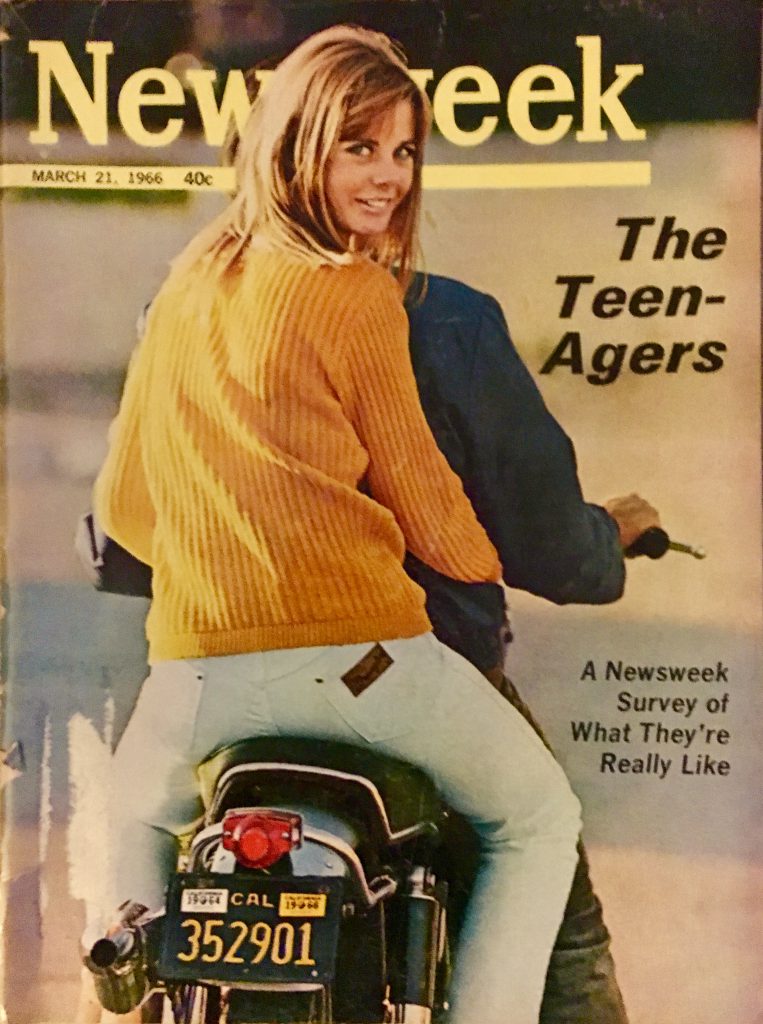Interview for Newsweek • Monday, March 21, 1966
This image is a cover of an audio recording, and the copyright for it is most likely owned by either the publisher of the work or the artist(s) which produced the recording or cover artwork in question. It is believed that the use of low-resolution images of such covers qualifies as fair use.
- Album This interview has been made to promote the Rubber Soul (US Mono) Official album.
Interview
How long can Animals, Beatles, Stones, Spoonfuls or Supremes survive in the musical jungle? The cruel laws of pop say they will die commercially before they are 30. But Beatles Paul McCartney, 23, and John Lennon, 25, need not fear advancing middle age. In the last three years, the Beatle bards have written 88 songs that have been recorded in 2,921 versions and have sold close to 200 million copies. Their total sales are pushing half a billion dollars. The songs sell because they carry the Beatles’ golden name. They also sell because they are as brilliantly original as any written today, respected and recorded by discriminating jazz groups like the Ramsey Lewis Trio and peerless vocalists like Ella Fitzgerald.
“We’ve barely started,” says the puckish McCartney. “We think in terms of 40 more years of writing.”
Their latest album of originals, “Rubber Soul,” now fourth on U.S. charts, marks a turning away from the percussive electric backgrounds of rhythm and blues to more intimate settings and subtler forms. Still simple and direct, their lyrics are no longer concerned with handholding, but with desertion, seduction and satire.
“You can’t be singing 15-year-old songs at 20 because you don’t think 15-year-old thoughts at 20,” explains McCartney, who, like Lennon, is both composer and lyricist.
Escape: McCartney and Lennon met as schoolboys in Liverpool in the mid-1950s when Lennon was setting his verse to the one chord he had mastered on the guitar. Chuck Berry, Little Richard, Elvis Presley and country music as well as traditional English music-hall ballads were their schooling.
“We used to play truant and go to his house or mine and mess about all afternoon,” says McCartney. “It was a great feeling of escape.”
“We were the only group then writing songs,” recalls Lennon, “so we used to say we had written a hundred even though it was really only thirty.”
“Love Me Do” became the first Lennon-McCartney hit in 1962, lifting the Beatles above the struggle for survival. Soon McCartney and Lennon were no longer gifted amateurs who could wait for the muse, but million-dollar professionals producing on demand.
“We needed a title song for ‘A Hard Day’s Night’,” the film’s producer, Walter Shenson, recalls. “The boys got to work and wrote, arranged, rehearsed and recorded the song in just over 24 hours.”
Says Lennon: “When we have an LP to do, we know we have to write twelve songs. I’ve never liked going to an office just to write, but we might have to do this soon. Otherwise a lot of ideas, good ones, get lost.”
Sharper Edge: Author of two successful volumes of satiric, punning verse, Lennon finds lyrics everywhere. His songs wield a sharper edge than McCartney’s, which strive more often for sweet simplicity. The two often write separately, but still influence each other heavily.
“A perfect example of how we work is ‘Drive My Car’,” said McCartney. “I wrote it with the key line ‘You can give me golden rings.’ When I played it to John at the recording session, he said ‘Crap! That’s too soft.’ He was right, so we finally ended up with ‘You can drive my car.’ The idea of the girl being a bitch was the same but it made the key line better.”
How McCartney and Lennon will fare as songwriters when they no longer perform their own works is open to question. “Whenever anyone else arranges them,” observes music critic Edward Tatnall Canby, one of the Beatles’ many classical converts, “they try to push the music into more conventional modes. The music comes out sounding uncomfortable. But there is no reason why they shouldn’t survive as long as they keep searching for new forms. They take what they find in front of them and turn it into music. They never say ‘how are we going to make this pay?’ And the wonderful thing is, it does pay, anyway.“
In “Rubber Soul,” the Beatles blend gospel, country music, baroque counterpoint and even French popular ballads into a style that is wholly their own. Says McCartney:
“Our best influences now are ourselves. We are so well established that we can bring fans along with us and stretch the limits of pop”.
And their own limits, too.
“We might write longer pieces,” says McCartney. “We want to write the whole score to our next film. We might write specifically for other people or for different instruments. You name it and it’s possible we could do it.”
“l wouldn’t mind being a white-haired old man writing songs,” adds McCartney, “but I’d hate to be a white-haired Beatle playing at Empress Stadium.”

Last updated on August 26, 2023